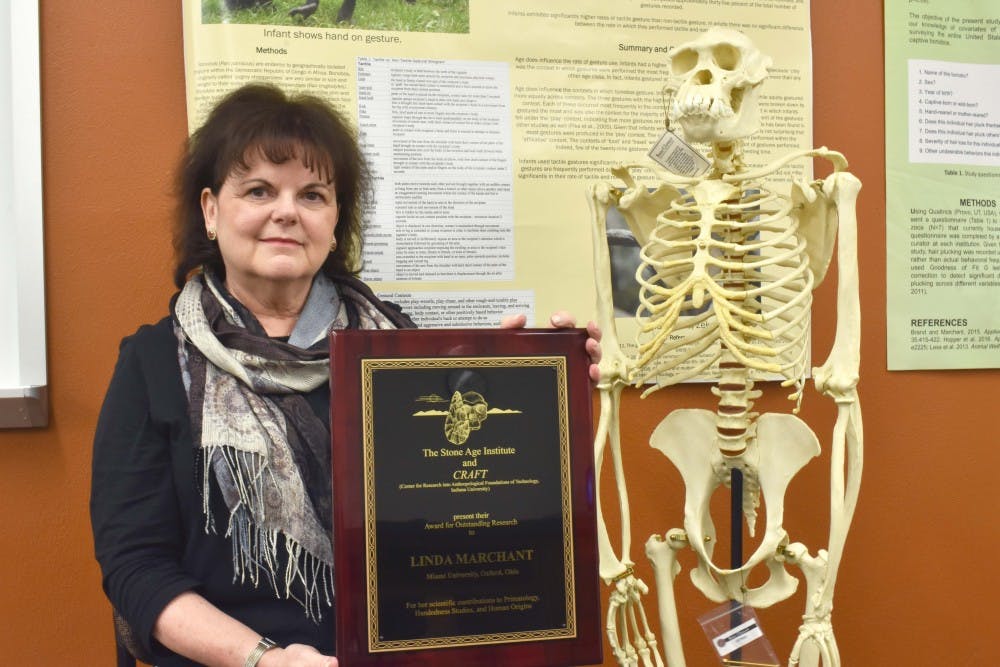Linda Marchant's office is located near the back of a small warren of rooms in a corner of Upham Hall. A printout of a meme is taped to the primatologist and professor of anthropology's door, expressing frustration with people who call apes "monkeys." Inside, books and papers fill the shelves along one wall and cover most flat surfaces, reflecting the knowledge and curiosity of the woman who sits in the middle of it all.
Marchant, a lifelong lover of science, animals and museums, recently received the award for Outstanding Research into Human Origins from the Center for Research into the Anthropological Foundations of Technology (CRAFT) and the Stone Age Institute (SAI).
This prestigious award, once given to famed primatologist Jane Goodall, recognizes Marchant's research on chimpanzees.
"Chimpanzees in their own right are extraordinary animals," Marchant said. "They are also our closest genetic relative."
Marchant has studied these primates in various sites throughout Africa and in captivity to gain insight into their behavior and how it might reflect human origins.
One major aspect of her research is handedness.
An overwhelming percentage of humans are right-handed in every activity, from writing to throwing to picking up items. Through extensive observation, Dr. Marchant has noticed that this imbalance in everyday activities does not exist in chimpanzees.
The only activities in which they show strong hand preference are those relating to tools, such as making or using a tool. Even then, there is an even split between left and right-handedness.
"When they use tools, it's a departure from 'it doesn't matter," Marchant said. "So I think there's something about the motor demands and complexity of tool use that starts manifesting some kind of hand preference."
Another prominent feature of Marchant's research is the documentation of variations in culture patterns. In studying chimpanzees from west to east Africa, she has found that cultural traditions vary by population.
"From an anthropological point of view you're very interested in how patterns emerge, how are they propagated, how do they persist and in what context are they displayed," said Marchant.
In particular, Marchant has observed the methods by which chimpanzees gather food. Some populations go "termite-fishing" in termite mounds, while others are unaware that those termites are worth eating and do not bother with them. Some crack open oil palm nuts with stones, while others walk right past the palms, unaware there is food inside the nuts.
Enjoy what you're reading?
Signup for our newsletter
Grooming is also a context in which culture can be found. Marchant has observed populations in which chimpanzees clasped hands above their heads while they groomed one another.
"We are heavily embedded in culture as Homo sapiens," Marchant said, "And there are a number of other species that are argued to have culture patterns, so why not look for models in other taxa?"
While Marchant has been formally recognized for her research, her colleagues and students also laud her for her passion and mentorship.
Julienne Rutherford, a professor at the University of Illinois-Chicago and one of Marchant's former students, described her as a "funny, spritely, fierce, brilliant woman."
Rutherford knew Marchant was different from the beginning of her first class.
"I have always been in love with school," said Rutherford, who graduated from Miami in 1996. "But something new happens to your heart when your professor climbs up on top of the desk to pant hoot while knuckle-walking."
Jill Pruetz, professor of anthropology at Texas State University, recalled her first trip to Senegal with Marchant.
"Among all the valuable lessons I learned from [Linda] as a primatologist, I also genuinely enjoyed sharing that often tough field experience with her," Pruetz said."She has a lovely singing voice and excellent French accent, but she also does an amazing frog imitation, and I literally saw her run faster than I thought humanly possible."
Marchant laughed at the memory, admitting that she was probably running from African bees.
"Trust me, in the field you wind up running a lot," she said.
In Africa, a land of bees, snakes, leopards, hyena, buffalo, hippos and beyond, Marchant has proven herself to be far from timid.
"You can be subject to the vagaries of accidents and emergencies everywhere," Marchant said. "And what do I do, stay home and hide under my bed?"
It's in the field where Marchant sees her colleagues and students discover their inner resources and find out what they're capable of. She helps them through it, and, back in the classroom, she does the same.
"I think I'm a talent spotter," Marchant said. "I'm creating opportunities, and then they embrace it and they just run with it... If they've got the ability, they just have to get the opportunity and the support."
Marchant is active with her students, even those with majors outside her department. If she can excite, appall or otherwise emotionally engage them, she considers that a success. Her students have become researchers, published authors and presenters at conferences even at the undergraduate level.
"Linda taught me, as she has countless students and colleagues, that serious science can also be full of joy and laughter," Rutherford said. "[She taught me] that you don't have to sell your soul to become a great scholar, that you introduce your students to your colleagues and that no matter what, never ever let the bastards get you down."
arwinejk@miamioh.edu




